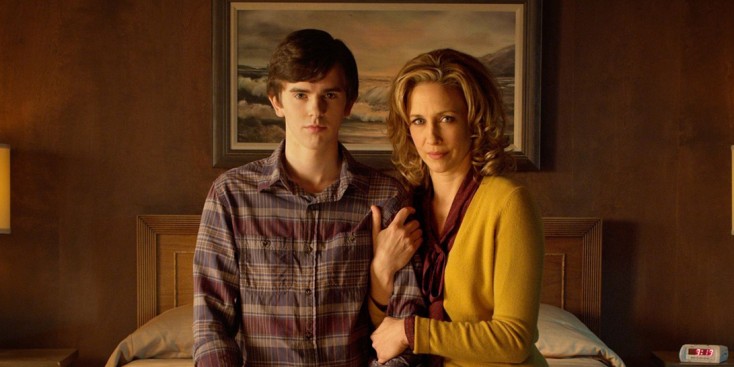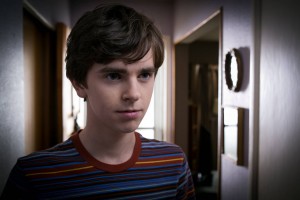By ANGELA DAWSON
Front Row Features
HOLLYWOOD—The final episode of the season for the eerie drama series “Bates Motel” airs Monday on A&E. Series star Freddie Highmore, who plays conflicted oddball Norman Bates opposite Vera Farmiga, who plays his manipulative mother, Norma, promises some resolutions and plot developments that should please fans of the show, now wrapping its second season.
The tall and lanky British actor has come a long way since he played dirt poor Charlie Bucket who finds a golden ticket in “Charlie and the Chocolate Factory” and young Peter Davies in “Finding Neverland.” He’s now a 22-year-old about to conclude his studies at Cambridge University, which he has managed to juggle while starring in the popular cable series about the ultimate mama’s boy who winds up becoming a serial killer. The series has been renewed for a third season, and executive producer Carlton Cuse, says he and co-producer Kerry Ehrin, know where they’re going with the story, regardless of how many seasons it ends up running.
“We’re having discussions with A&E and Universal Studios about just how many episodes we’re going to do to finish the show,” he says. “It’s definitely a show that has a beginning, middle and end, and I think we’re kind of getting to the point where we need to sort of define that with the studio and the network and kind of figure out exactly how many more episodes we’re going to do. I’m hoping we’ll be able to work that out, because we do know where we’re going to end.”
Highmore recently spoke about the “Bates Motel” season finale and what he’s anticipating for the third season.
Q: How has your style of acting evolved, and was it hard to break free from the cute kid mold to do something a little bit darker like this? How have you avoided the pitfalls others have fallen into?
Highmore: I’ve always been relatively distant from the film world whenever I wasn’t doing one myself. So I was able to go to a normal school. Right now, I’m a couple of weeks away from doing my final exams at university. Having always combined acting with my studies, that’s given me a nice sense of distance in terms of not falling into the pitfalls. In terms of my evolution as an actor, I guess you become more aware as you get older of how lucky you’ve been to go on these fantastic sets. Norman Bates certainly is different (from other characters I’ve played), but I never sort of transitioned from a sort of child actor to a young adult. I just saw it as a natural transition.
Q; Are you a fan of the original “Psycho” starring Anthony Perkins?
Highmore: I first saw it when I was 14 and then saw it a couple more times before finally doing “Bates Motel.” I haven’t returned to it since. Both Carlton and Kerry make us feel free to bring our own ideas. So we don’t feel tied to the original material, which I think is so key to the show. There was never a sense of mimicking him. It was more sort of seeing him in the original film as an inspiration.
Q; Have you come across any challenges in regards to portraying Norman Bates as a younger Norman?
Highmore: This is my first TV show, so you sort of are slightly uncertain as to where your character is going to go, so there’s that excitement. But from my perspective it’s this constant build towards ultimately Norman going psycho. There’s certainly that build towards a climatic moment.
Q: How do you think this finale compares to the first season finale?
Highmore: The whole arc of the second season has been fantastic for Norman. There’s always the time that you need in terms of establishing a character and seeing him as he is before he starts off on his journey. Towards the end of this season we certainly see start to see this small manipulative side to Norman. You start to question your allegiance to him, which has been great fun as an actor to play because you play against the sense of what people think Norman should be like. There comes a point where you wonder to what extent can you continue to support his actions. There’s kind of a growing realization by Norman of who he is, who he might become and what he’s capable of. There’s this sense of power for him. What I think is great about this episode is to what extent would that power Norman take. By the end of the episode, you have to wonder: are we still with him or not?
Q: Can we expect an answer by the end of this season about who killed Ms. Watson (Norman’s teacher)? And what was the greatest challenge for you in making the audience question whether Norman was her killer?
Highmore: There will be an answer to that question before the end of the season. It’s tricky in terms of not wanting to spoil too much. They’ve toyed with the audience about the relationship between Norma and Norman. It’s like an elastic band that’s been stretched out but then ultimately it returns to its original shape. Norma and Norman always seem to get over whatever challenges they’ve had previously up until now. With the finale, it’s inconclusive as to whether that bond has been (set) and whether Norma and Norman can kind of continue along the path that they were going before or whether they can’t ignore such key facts about each other any longer.
Q: If Norman were to suddenly be well, which woman on the show do you think he would end up with and be happy?
Highmore: I guess his mother really. That’s the ultimate question: would they be great together or awful? I don’t know. There’s this still kind of unexplored relationship with Emma (played by Olivia Cook). They’ve got tension there. In this episode, we see Norman’s relationship with Emma take a twist, and perhaps the one that we expected.
Q: Can you talk about your relationship with Vera Farmiga? Did you immediately know the chemistry was there when you first started working together?
Highmore: Yes, I think so. Obviously, it has evolved over time. That’s sort of the joys of being on a TV show. I’ve grown incredibly close to her, her husband and children. I spend a lot of time at their house. I guess they’ve been sort of my family away from home. They’ve just been absolutely wonderful and they’re my very best friends. I’m just incredibly lucky on a personal level to have met them.
Q: Are you a social media guy? Do you Twitter or Facebook, or do you try and stay away from that?
Highmore: I’ve stayed away from it up until now. I email and stuff. I’m not completely cut off in technology. But I haven’t been much of a social media guy.
Q: I wanted to know what your plans are for your hiatus and how much time do you have before you start the third season production?
Highmore: A large part of the hiatus has already passed since we finished shooting just before winter. Since then, I’ve been back at Cambridge and carrying on with this last year of school. As for the summer, I guess it depends to some extent what time we actually end up starting up again with the third season. So, I guess we’ll see.
Q: How do you sort of tap into that strange yet unique connection between Norman and Norma?
Highmore: You kind of completely disengage from the relationship that you know you have with Vera. Certainly, being comfortable with her, any sort of more intimate or more borderline moments never feel awkward. We both sort of commit to whatever it is on the page. Exploring that relationship has been wonderful and certainly one of the best things about the show.
Q: Will Norman and Norma reconnect before the end of this season or will we kind of have to see them get back together on that same level in the next season?
Highmore: One of the great things about the show is that it’s never overly conclusive. They never shove the conclusion down your throat saying, “Oh, this is how you must think” or “This is your take on Norma and Norman’s relationship.” And so I imagine and I hope that various people will see the end differently and come out of it with a different opinion from the person sitting next to them. That’s what makes the show great. It sparks debate. Even amongst those of us on the show, there’s this since of constant dialogue and constant discussion as to the boundaries being crossed or what stage a certain relationship is. It’s nothing kind of definitive or easily distinguished; it’s just more a sense of reality than fiction.






